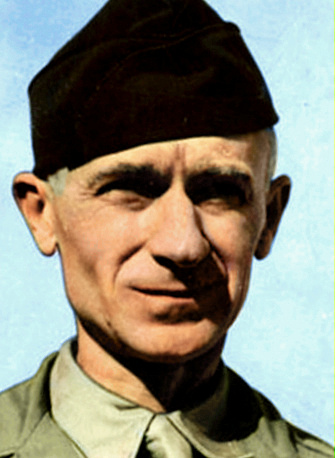Nazi rail lines in Italy blasted
…
Jap port cut off from shipping
By the United Press
…
Meet no opposition in new landing
…
Six celebrities associated with Searching Wind on way here
…
‘Battle of fashion houses’ ends for humor-finding girl writer
By Judy Barden, North American Newspaper Alliance
…
By Jack Cuddy, United Press staff writer
…
…

By Ernie Pyle
IN THE WESTERN PACIFIC (delayed) – When our planes come back from a strike, they circle around the ship until they get the signal to land.
Then they break out of formation one at a time into what is called the “landing circle.” They try to space it so that one plane will be landed and clear of the “barrier,” just as the next one approaches.
When an approaching pilot is about half a mile out, the landing signal officer begins giving him sign-language instructions.
The landing signal officer is known as the LSO. He is one of the most important men on the ship. He is a flier himself. But his is no part-time job that is traded around among the pilots. He has been especially trained, and that is his sole job.
The LSO stands on a platform just off the stern. Behind him is a large square of canvas, to make a background for his signals. Underneath the platform is a heavy rope netting, to catch him if he should fall off.
He wears a yellow sweater and yellow helmet, so the incoming pilots can easily spot him. And in each hand is a paddle about twice the size of a ping-pong paddle. They are either yellow or bright orange. These are his signal paddles.
From the moment the LSO starts his signals the incoming pilot never takes his eyes off of him. From that point on, the LSO actually flies the plane on remote control, and the pilot is only a robot who does what the LSO tells him to do.
By sign language, the LSO tells him he’s too high or too low, too fast or too slow, that his tail hook isn’t down, or a dozen different things.
Split-second thinking
The pilot corrects these mistakes as he approaches. If his correction is perfect, the LSO gives him the “cut” sign just before he reaches the flight deck.
Instantly he takes his eyes off the LSO and more begins flying his own plane. Only half a dozen seconds are left. He has to act fast, and get that plane down.
But if the approach isn’t quite right, then the LSO at the very last second gives him a frantic “wave off” signal, and the pilot “pours on the coal,” misses the deck by a scant few feet, and goes around for another try.
The LSO must decide at the last moment, actually in a fraction of a second, whether to let the pilot try it or not. I don’t know of any situation that requires faster mind-making-up. You sure can’t go into “conference” with anybody on that one.
The landing signal officer on our ship is a fine man. His name is Bill Green, and he comes from Newton, Iowa. He is a lieutenant.
He graduated from a commerce course at the University of Iowa in 1942, and was honorable mention for All-American that year. He intends to be a lawyer.
An LSO first must be a flier himself; second, he must be a man of steady nerves and sound judgment; and third he must be a psychologist in a way, and know his pilots.
Bill Green is all three. Everybody likes him, and everybody has faith in him. It would be a sad bunch of pilots who had an incompetent LSO.
Identifies pilots by planes’ movements
Bill knows the flying traits of each pilot so well that he can identify every one just by the movements of his plane, when he is still a mile from the ship!
In watching our landings, I saw one pilot “waved off” seven times one day before he got in. So, I asked Bill if that was a record. He said it certainly was not. A few months ago, he had to wave off a pilot 21 times before he finally got aboard. Which meant that one pilot was trying to land for almost two hours!
The landing signal officer’s job is a precarious one. Many a time Bill has had to duck, jump or even run. The ship’s photo lab has a marvelous picture of Bill actually being chased across the deck by a plane making a near-crash landing.
There is always an assistant LSO on every carrier, in training to take over a regular job himself. Bill’s assistant is Ens. Kal Porter of Ogden, Utah.
One day I got up my nerve, and went back and stood with them while they landed a whole flight of planes. You would swear every plane was going to land right on top of you. Before it was over I had decided that if I were running the Navy, I’d let them all land in the water.